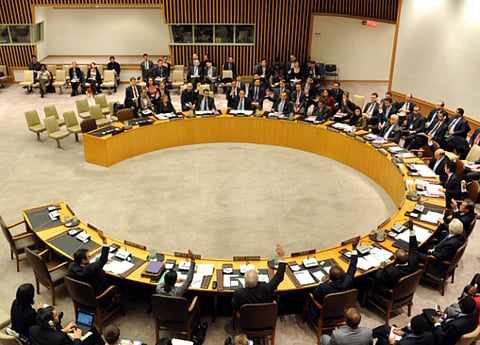Saudi UN Security Council rejection 'not impetuous’
The world should have anticipated decision, newspaper editor says

Manama: While the western diplomatic community is still expressing astonishment over the announcement by Saudi Arabia that it would not be taking up the seat it has won at the United Nations Security Council, Saudis are stressing that the signals have been there all along and that the world should have anticipated the decision.
“In February, the custodian of the two holy mosques said in his address to the Islamic summit in Cairo that ‘we would turn our backs to the Security Council if it failed’. The Council has failed,” Salman Al Dossari, the editor-in-Chief of Saudi daily Al Eqtisdaiya said.
“And before him, Saud Al Faisal, the foreign minister, said at the Security Council during the war on Gaza, that Saudi Arabia would turn its back to the Council if it failed to resolve our issues. I do not think there is any doubt that the Council did fail to address the issues in the region. Saudi Arabia has simply thrown a stone in the Security Council stagnant waters. Riyadh may go on with the decision or revoke it, but the message to all, particularly Washington and Moscow, is clear. It is obvious that Saudi Arabia has several cards that it can use should matters become complicated diplomatically,” he said.
The reference to earlier warning was also mentioned by London-based Saudi daily Al Sharq Al Awsat in its editorial on Monday as it highlighted how Saudi Arabia has been sending clear signals to the United Nations and the international community.
“It was not an instant decision since the Saudi King expressed in the beginning of the year Riyadh’s anger with the status of the United Nations following the failure of the Security Council to address the issues in Syria and Palestine,” the daily said.
“The king clearly said that Muslims and Arabs had to build together their capacity to solve their problems by themselves. Earlier, and following a double veto by Russia and China on the situation in Syria, he told guests at the Janadriya Cultural festival that the world’s confidence in the United Nations has, undoubtedly, been shaken.”
Saudis also pointed to the decision by Saudi Arabia this month not to address the United Nations General Assembly as a clear indication of their position towards it.
Writing in the Saudi daily Al Riyadh, Mutlaq Saud Al Mutairi, insisted that the Saudi position towards the Council was not “impetuous” and that the indication was obvious in the decision not to deliver the annual address.
Al Dossari refused reports about an abrupt Saudi about-face since the kingdom rejected the seat only hours after winning it.
“The Saudi diplomacy does not make angry reactions without valid reasons. Riyadh has never been keen on ostentatious and trivial policies, either. If the Saudis express anger, it is because they have been extremely patient and sought to address the issue calmly and behind doors. It is obvious that in this case, it did not work,” he said.
Criticising the Saudi decision, Richard LeBaron wrote in his piece “Pique is Not a Policy” that “Saudi Arabia’s election to the post was a result of an active campaign by the Saudis over the last year in which they expended considerable political capital, and likely some financial resources, to be selected without opposition from others in their regional UN grouping.”
However, Al Dossari rejected the criticism by the visiting senior fellow with the Rafik Hariri Centre for the Middle East working on the Gulf region.
“Saudi Arabia could not do what it did now and speak loudly for the whole world to hear if it did not win a seat in the Security Council. There could be divergent views on whether it would be better to work from the inside or to reject the seat as Saudi Arabia did. However, the important thing was to send a clear message to the international community. This message would not have been heard of if the Saudis has not win the seat. In fact, Riyadh gave significance to the seat,” he said.
Meanwhile, Kuwaiti diplomats have denied media reports that Kuwait would supplant Saudi Arabia at the Security Council.
Reports said that Kuwait was next on the list of Asian countries to take the two-year membership on January 1.
However, Kuwaiti daily Al Kuwaitya on Sunday reported that “diplomatic sources denied the claims that Kuwait had accepted to take the Security Council seat.”
The daily did not identify the sources.



